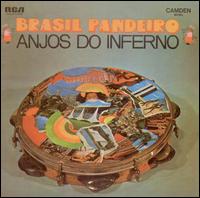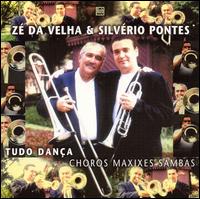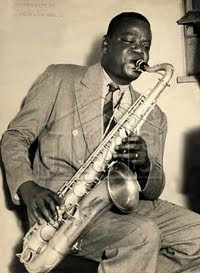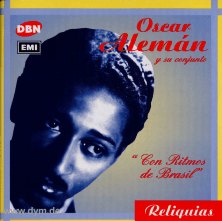 Doing research on possible sources for the Brasilian repertoire of Oscar Alemán I came across the vocal ensemble named ANJOS DO INFERNO, a highly popular group in Brazil during the 1930'ies and 1940'ies. Below I add the info on the career of the ANJOS DO INFERNO supplied by Alvaro Neder in AMS.
Doing research on possible sources for the Brasilian repertoire of Oscar Alemán I came across the vocal ensemble named ANJOS DO INFERNO, a highly popular group in Brazil during the 1930'ies and 1940'ies. Below I add the info on the career of the ANJOS DO INFERNO supplied by Alvaro Neder in AMS."The most famous vocal and instrumental group of the Golden Era of Brazilian song, the Anjos do Inferno were insuperable in their 20-year international career, in terms of rhythm, humor, and bossa. The group was founded in 1934 by singer Oto Alves Borges with the following members: Oto Borges (crooner), Antônio Barbosa (pandeiro), Moacir Bittencourt (violão), Felipe Brasil (violão), José Barbosa (violão tenor), and Milton Campos ("nasal trumpet," the first musician to dedicate himself to that in Brazil). The group opened at Rádio Cajuti and Cruzeiro do Sul, recording for the first time for Columbia ("Morena Complicada" by Kid Pepe, and "Amei Demais" by Kid Pepe and Siqueira Filho), but having no major impact. Returning from a U.S. tour in 1936, singer Leo Vilar assumed the group's direction while Oto Borges dedicated himself exclusively to his activities at the Banco do Brasil. Soon the group was hired for the Cassino Icaraí, where they achieved success. The next recording, still in 1936, was Kid Pepe's "Maria Foi à Fonte." In the same year the Anjos became part of the cast of the Rádio Mayrink Veiga, where they continued until 1938. In that year, Leo Vilar fired the brothers Antônio and José Barbosa, replacing them with Alberto Paes (pandeiro) and Aluísio Ferreira (violão tenor), and substituting Milton Campos for Harry Vasco de Almeida in the "nasal trumpet" position. With that formation the group opened at Rádio Tupi, where they would remain until 1946, performed at the Cassino da Urca, and recorded for Columbia the first album of that phase, with Almanir Grego's march "Tim Tim por Tim Tim" and Alberto Paes/Domício Augusto's samba "Dura Lex sed Lex." But the first hit came with the samba-canção "Bahia, oi, Bahia" (Vicente Paiva/Augusto Mequita). With the success they became Columbia's exclusive artists, and after that they piled hit over hit, including the rumba "Barraco Abandonado" (Afonso Scola/Hermínio Viana), the samba-jongo "Me Ensina a sambar" (Antônio Almeida), the samba "Baiana Boa" (Milton Bittencourt), the samba "Quem Dirá?" (Pandiá Pires/Roberto Martins), the samba "Helena! Helena!" (Antônio Almeida/Secundino Silva), the march "Cowboy do Amor" (Wilson Batista/Roberto Martins), the march "Todo Mundo Dança" (Valdemar Silva/Raul Marques), the samba "Me Deixa Viver" (Bide/Marçal), the march "Quebra Tudo" (João de Barro/Alberto Ribeiro), and the march "Três Marias" (Cristóvão de Alencar/Frazão). They had several other hits, including the second and last Assis Valente samba recorded by the group, "Já que Está Deixa Ficar," and their biggest one, the Dorival Caymmi samba "Você já Foi à Bahia?."
In 1942 the group went through changes, with Hélio Verri replacing Alberto Paes at the pandeiro, Roberto "Paciência" Medeiros taking Moacir Bittencourt's place, and Walther Pinheiro substituting Felipe Brasil. Renato Batista (Marília Batista's brother) replaced Walther Pinheiro for a short while, and when the latter returned to the group it became a septet for some months. Pinheiro is present in the recording of the Dorival Caymmi sambas "Vatapá" and "Rosa Morena." In the next year the group switched to Columbia, where they
recorded the hits "Acontece que eu sou Baiano" and "Vestido de Bolero." In 1944 they were hired by RCA Victor, where they remained until 1952. There they recorded, among many albums, the samba "Que Gostinho Bom" (Marino Pinto/Mário Rossi), the samba "Bolinha de Papel" (Geraldo Pereira), the samba "Diz que Sim, Diz que Não" (Mário Lago), and the march "Cordão dos Puxa-sacos" (Frazão/Roberto Martins). In 1944 they performed in the film Abacaxi Azul. In 1946 they toured through Argentina and Mexico, with José Soares (the Russinho) replacing Hélio Verri. In February 1947 they opened in the biggest Latin American nightclub of those times, El Pateo, in Mexico City. They had been hired for six weeks, but stayed for four years. From Mexico, in 1948, several members emigrated to the U.S. joining the Bando da Lua: Harry Vasco de Almeida, Aluísio Ferreira, Walther Pinheiro, and Russinho. Vilar called other musicians from Brazil to replace them, former members of the Os Namorados: Nanai (violão), Miltinho (at the pandeiro then, he would become famous later as a singer), and Chicão (former Quitandinha Serenaders, violão tenor and tantã). In the new formation, the group toured U.S., performed in Los Angeles together with Carmen Miranda, and kept for two years a radio program about aspects of Brazil. In Mexico, the Anjos do Inferno participated in 11 films, eight of them featuring Ninón Sevilla, a big star then.
In 1951 they returned to Brazil after a tour through Chile and Argentina, hired for the anniversary of Recife's Rádio Jornal do Comércio. The group also came back to Rádio Tupi, spent a season at the Monte Carlo nightclub, and, in São Paulo, performed at Rádio Excelsior and the Oasis nightclub. In 1953 the Anjos had a season at Rio's Rádio Nacional. But the successful tours were troubled by an increase in the price of plane tickets, and, finally, Leo Vilar was forced to dissolve the group. In 1959, especially for Max Nunes, J. Maia, and José Mauro's play De Cabral a JK, Vilar organized a group under the denomination Anjos do Inferno, with he himself as crooner and percussionist, as well as Gaúcho (violão), Paulo César (tantã), and Miguel Ângelo (pandeiro). They also worked as actors in the play, which had a six-month season. This formation recorded some minor albums through Copacabana. In 1967, Walter Pinheiro, Aluísio Ferreira, Roberto Medeiros, Harry Vasco de Almeida, and Russinho got together to play on Mondays at the Arena Clube de Arte in Rio, where they told stories and remembered the old times."
Soundclips from the shown cd by ANJOS DO INFERNO available here
You may also have an opportunity to watch a video clip from one of the films featuring ANJOS DO INFERNO, "Perdida" from 1949, click here for a performance by singer Ninon Sevilla and Os Anjos do Inferno.
Jo
 Two of the musicians, who a.o. contributed to the success of the sound-track of Mika Kaurismäki's 'Brasileirinho', are trombonist Zé da Velha and trumpeter Silverio Pontes. The two have teamed and performed together since 1991 when they started a co-work to spread their highly enjoable and danceable renditions of choro and related genres as true masters of the Gafieira tradition in Brazil. Zé da Velha, a member of the old guard, having played with Pixinguinha and other great musicians, provides that trombone sound full of choro swing, drawing the maximum effect from the minimum of notes. Silvério Pontes, 20 years younger, adds a jazz feel to the mix, with his agile melodic inventions.
Two of the musicians, who a.o. contributed to the success of the sound-track of Mika Kaurismäki's 'Brasileirinho', are trombonist Zé da Velha and trumpeter Silverio Pontes. The two have teamed and performed together since 1991 when they started a co-work to spread their highly enjoable and danceable renditions of choro and related genres as true masters of the Gafieira tradition in Brazil. Zé da Velha, a member of the old guard, having played with Pixinguinha and other great musicians, provides that trombone sound full of choro swing, drawing the maximum effect from the minimum of notes. Silvério Pontes, 20 years younger, adds a jazz feel to the mix, with his agile melodic inventions.






